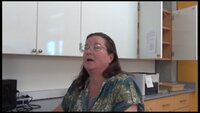| Title |
Jennings, Cristine OH19_017 |
| Creator |
Weber State University, Stewart Library: Oral History Program. |
| Contributors |
Jennings, Cristine, Interviewee; Taylor, Sarah, Interviewer; Kenner, Marina, Video Technician |
| Description |
The Beyond Suffrage Project was initiated to examine the impact women have had on northern Utah. Weber State University explored and documented women past and present who have influenced the history of the community, the development of education, and are bringing the area forward for the next generation. The project looked at how the 19th Amendment gave women a voice and representation, and was the catalyst for the way women became involved in the progress of the local area. The project examines the 50 years (1870-1920) before the amendment, the decades to follow and how women are making history today. |
| Abstract |
The following is an oral history interview with Cristine Jennings, conducted on August 15, 2019, in her office, by Sarah Tyalor. Cristine discusses her life, her memories at Weber State University, and the impact of the 19th Amendment. Marina Kenner, the video technician, is also present during this interview.; The following is a video clip of an oral history interview with Cristine Jennings on August 15, 2019. In this video clip, Cristine discusses the impact of the 19th Amendment. |
| Subject |
Voting--United States; Women--suffrage; Women--Rights of women; Universities and colleges; Women in higher education; Universities and colleges--Faculty; Women college administrators; Women in mathematics; Mathematics |
| Keywords |
Math educators; Female math educators; Women's voting rights |
| Digital Publisher |
Stewart Library, Weber State University, Ogden, Utah, United States of America |
| Date |
2019 |
| Date Digital |
2019 |
| Medium |
oral histories (literary genre) |
| Spatial Coverage |
Ogden, Weber County, Utah, United States, http://sws.geonames.org/11788968, 41.22809, -111.96766; Salt Lake City, Salt Lake, Utah, United States, http://sws.geonames.org/5780993, 40.76078, -111.89105; Cherryville, British Columbia, Canada, http://sws.geonames.org/5920990, 50.24152, -118.61901 |
| Type |
Text; Image/StillImage; Image/MovingImage |
| Access Extent |
63 page PDF; Video clip is an mp4 file, 75.0 MB |
| Conversion Specifications |
Filmed using a Sony HDR-CX430V digital video camera. Sound was recorded with a Sony ECM-AW3(T) bluetooth microphone. Transcribed using Express Scribe Transcription Software Pro 6.10 Copyright NCH Software. |
| Language |
eng |
| Rights |
Materials may be used for non-profit and educational purposes, please credit University Archives; Weber State University |
| Source |
Jennings, Cristine OH19_017 Weber State University Archives |
| Format |
application/pdf; video/mp4 |
| ARK |
ark:/87278/s6gt0phn |
| Setname |
wsu_bs_oh |
| ID |
105429 |
| Reference URL |
https://digital.weber.edu/ark:/87278/s6gt0phn |
| Title |
Jennings, Cristine OH19_017 |
| Creator |
Weber State University, Stewart Library: Oral History Program. |
| Contributors |
Jennings, Cristine, Interviewee; Taylor, Sarah, Interviewer; Kenner, Marina, Video Technician |
| Description |
The Beyond Suffrage Project was initiated to examine the impact women have had on northern Utah. Weber State University explored and documented women past and present who have influenced the history of the community, the development of education, and are bringing the area forward for the next generation. The project looked at how the 19th Amendment gave women a voice and representation, and was the catalyst for the way women became involved in the progress of the local area. The project examines the 50 years (1870-1920) before the amendment, the decades to follow and how women are making history today. |
| Abstract |
The following is an oral history interview with Cristine Jennings, conducted on August 15, 2019, in her office, by Sarah Tyalor. Cristine discusses her life, her memories at Weber State University, and the impact of the 19th Amendment. Marina Kenner, the video technician, is also present during this interview. |
| Image Captions |
Cristine Jennings Circa 2017; Cristine Jennings 15 August 2019 |
| Subject |
Voting--United States; Women--suffrage; Women--Rights of women; Universities and colleges; Women in higher education; Universities and colleges--Faculty; Women college administrators; Women in mathematics; Mathematics |
| Keywords |
Math educators; Female math educators; Women's voting rights |
| Digital Publisher |
Stewart Library, Weber State University, Ogden, Utah, United States of America |
| Date Digital |
2019 |
| Medium |
oral histories (literary genre) |
| Spatial Coverage |
Ogden, Weber County, Utah, United States, http://sws.geonames.org/11788968, 41.22809, -111.96766; Salt Lake City, Salt Lake, Utah, United States, http://sws.geonames.org/5780993, 40.76078, -111.89105; Cherryville, British Columbia, Canada, http://sws.geonames.org/5920990, 50.24152, -118.61901 |
| Type |
Text; Image/StillImage |
| Access Extent |
63 page PDF |
| Language |
eng |
| Rights |
Materials may be used for non-profit and educational purposes, please credit University Archives; Weber State University |
| Source |
Jennings, Cristine OH19_017 Weber State University Archives |
| Format |
application/pdf |
| Setname |
wsu_bs_oh |
| ID |
105547 |
| Reference URL |
https://digital.weber.edu/ark:/87278/s6gt0phn/105547 |





